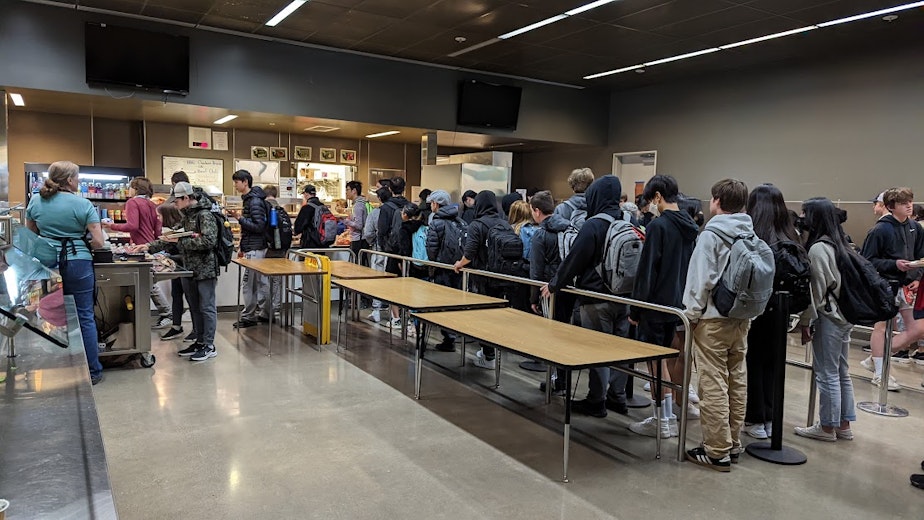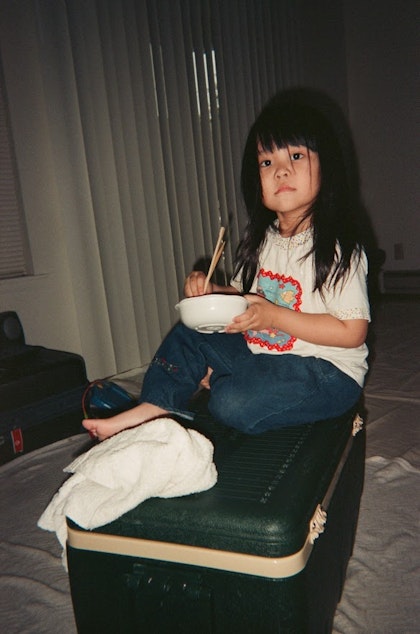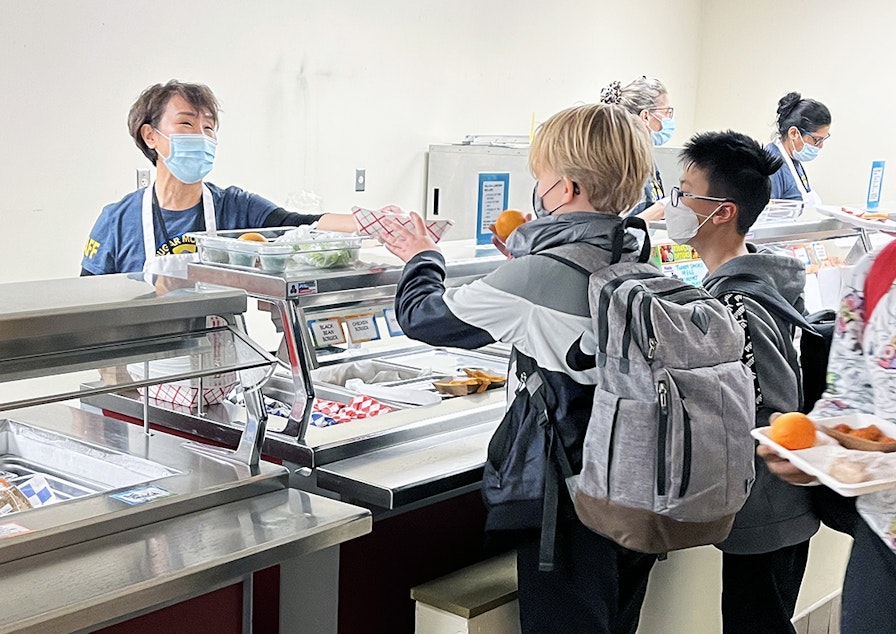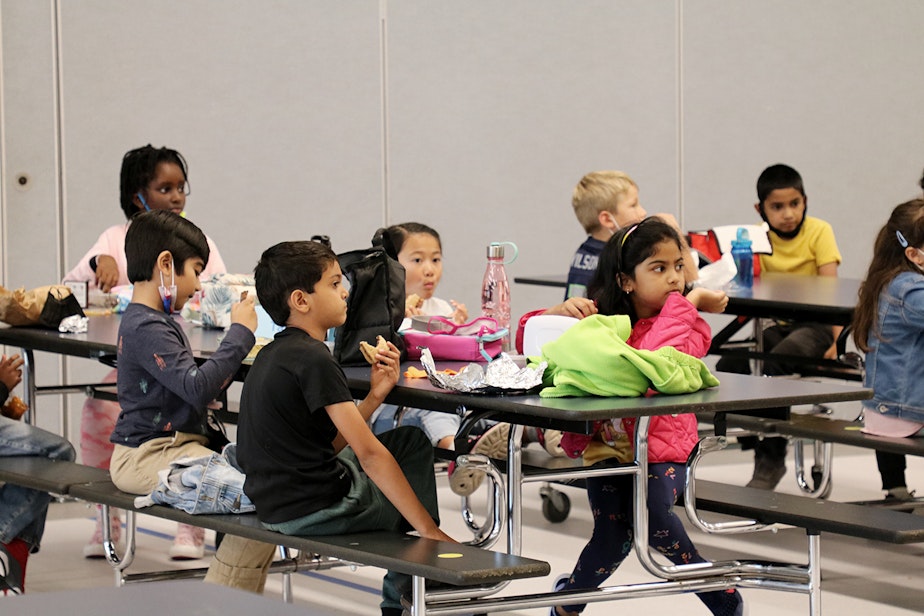Free lunch at school is more than just a meal — it's fuel for students' futures

During the pandemic, school lunch became free for all students, regardless of their family’s income. That was thanks to federal government waivers.
But those waivers expired on June 30. RadioActive Youth Media’s Colin Yuen spoke to advocates for keeping school lunch free for all.
[RadioActive Youth Media is KUOW's radio journalism and audio storytelling program for young people. This story was entirely youth-produced, from the writing to the audio editing.]
F
or the past few years, I’ve been able to get free lunches at school. Everyone has.
I'm a rising senior at Issaquah High School, and I've seen free meals for everyone do two things.
One, it takes away the barrier of having to enroll in free and reduced-price lunch programs. And two, it ends the stigma that can come with getting free lunches at school.
But this fall, many Washington schools are going back to the way things were before the pandemic.
Sponsored
Students can still get free or reduced-price lunches at school. But for most students, their families now have to meet certain income requirements to be eligible, and they have to do paperwork to enroll.
Melissa Takai knows all about it. Takai is a 23-year-old designer who used to work at KUOW. She grew up and went to public school in south King County. Growing up, she said her family qualified for her to get free lunch at school, but her parents didn’t enroll her. She said the paperwork was long and complicated.
“My parents, they don't know how to fill out the forms because English is their second language," Takai said. "My mom is Thai and my dad is Japanese. So I would have had to fill [the forms] out. But I was a kid. So I don't know any of that stuff.”

On top of the paperwork, Takai said there’s a stigma associated with programs for low-income families.
Sponsored
“I think my parents were hesitant to sign me up for a free and reduced lunch. Maybe they were shameful because we were low-income. And you kind of have to admit that when you sign up for the free and reduced lunch," Takai said.
A spokesperson for my district, the Issaquah School District, said they try to get all students who qualify for free or reduced-price lunch enrolled in the National School Lunch Program at the beginning of the year. But if a student who isn’t enrolled wants a meal and can’t pay for it, the school gives them a full meal and charges their school account for it. That unpaid charge then follows the student while they’re in the district, and they’re sent weekly reminders about it. At the end of the year, the district writes off any uncollectable meal debt as a deduction on their taxes.

Jeff Lew, a father of three, has been an advocate for universal free lunch since 2017. Lew's kids are enrolled in Seattle Public Schools, and he started an organization called Lunch Debt to promote free lunch for all. Like Takai, Lew said enrolling in free lunch programs is a barrier for the families who may need it the most.
“There's a lot of paperwork involved to get qualified for free and reduced lunch," Lew said. "And there are families that are undocumented that are scared to fill out this paperwork because, you know, it's a federally subsidized program. So they don't want their information out there.”
Sponsored
During the pandemic, Lew said, students got to eat equally.
“You don't know who [is] coming from a tough background or a family that's struggling," Lew said. "Everyone just gets a meal.”

There are still schools in Washington that will offer free meals to all students this year, through a program called the Community Eligibility Provision. It allows schools in low-income areas to offer free school meals to all students. But only about 18% of Washington students go to one of these schools.
Melissa Takai said the whole point of school is to focus on learning. And when young people aren’t eating, it’s hard for them to do their best work.
Sponsored
Some U.S. lawmakers have proposed bills advocating for the extension of free meals at school, like Senator Bernie Sanders of Vermont. While his “Universal School Meals Program Act” has only been introduced in Congress, if passed, it would provide breakfast, lunch, and dinner to all students nationwide, regardless of income. States like California, Vermont, and Maine have also passed legislation to further extend universal school lunch programs in their states.
That’s why Jeff Lew wants people to reach out to local lawmakers and tell them they want lunches to be free for all students.
Because in the end, no one can learn on an empty stomach.
---
This story was produced in RadioActive Youth Media's Advanced Producers Workshop for high school and college-age youth. Production assistance by Kyle Norris and Charlotte Engrav. Edited by Katie Campbell. Prepared for the web by Kelsey Kupferer.
Sponsored
Find RadioActive on Instagram, Twitter, TikTok, YouTube and Facebook, and on the RadioActive podcast.
Support for KUOW's RadioActive comes from the Bill & Melinda Gates Foundation Discovery Center and BECU.
If you have any feedback on this story, you can email RadioActive at radioactive@kuow.org, or fill out the box below.



